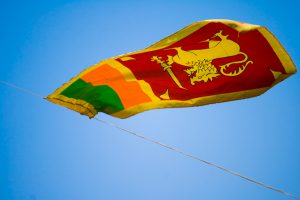Sri Lankan Tamil grievances are fast reemerging as an important issue in India-Sri Lanka relations. During his recent visit to Colombo, India’s External Affairs Minister S. Jaishankar called on the Sri Lankan government to implement the 13th amendment (or 13A as it is called) to the Sri Lankan Constitution.
It is in Sri Lanka’s “own interest” that the Tamil people’s expectations for “equality, justice, peace and dignity” within a united country are met, Jaishankar said in the presence of his Sri Lankan counterpart Dinesh Gunawardena at a press conference in the Sri Lankan capital. Drawing attention to “the commitments made by the Sri Lankan government on meaningful devolution, including the 13th Amendment to the Constitution,” the Indian foreign minister pointed out that “progress and prosperity of Sri Lanka will surely be advanced as a consequence” of its implementation.
Jaishankar’s statement is unlikely to have gone down well with the Sri Lankan government.
President Gotabaya Rajapaksa and his brother, Prime Minister Mahinda Rajapaksa, are strong proponents of the centralization of power and favor the scrapping of 13A or diluting its provisions. An array of forces among Sri Lanka’s Sinhalese majority, including parties like the ruling Sri Lanka Podujana Party and the Janata Vimukti Peramuna, as well as Sinhala nationalist and Buddhist organizations, want to see 13A repealed as they are against any power sharing with the island’s Tamil ethnic minority.
13A’s Indian origins is another important reason for opposition to it. Many Sinhalese nationalists argue that it was imposed against the wishes of the Sri Lankan people.
13A flowed from the India-Sri Lanka Agreement of 1987. It was envisaged as a political solution to the Sri Lankan Tamil insurgency which raged between 1983 and 2009. It provided for the devolution of power to nine elected provincial councils, including one for the Tamil-dominated North-Eastern Province.
However, with financial powers remaining under the control of the president, the power-sharing envisaged under 13A has not materialized, especially with regard to police and land, deepening disquiet among the island’s Tamil minority.
India has been pressing successive governments in Colombo to implement 13A; the Indian diplomatic establishment has long held the view that the ethnic conflict in Sri Lanka needs to be addressed politically. Besides, as a signatory to the agreement that led to 13A, ensuring its implementation is important for New Delhi. Its possible repeal by the Rajapaksa government “would be a political and diplomatic embarrassment” for India.
Domestic electoral compulsions are also driving the Narendra Modi government’s heightened interest in articulating support for the island’s Tamils.
India has a 69-million strong Tamil population living in the southern state of Tamil Nadu. There are strong ethnic, cultural and kinship links between these Tamils and those living across the Palk Strait in Sri Lanka.
Tamil nationalism runs deep in Tamil Nadu. The plight of Sri Lankan Tamils and their quest for political and other rights enjoys considerable support in Tamil Nadu and is an important election issue in the state.
In a few months from now, Tamil Nadu will vote in assembly elections and the rights of Sri Lankan Tamils will be among the issues that will figure in the campaigns of political parties. India’s ruling Bharatiya Janata Party (BJP), which has had a negligible presence in Tamil Nadu so far, is making a strong foray into the election arena in the state.
The BJP would like to be seen by voters to be a strong proponent of Tamil rights. This underlies the Modi government’s repeated and robust calls to Colombo to implement 13A. Silence on 13A, even as the Rajapaksa government moves steadily to dilute or repeal it, would be disastrous for the BJP’s electoral efforts in Tamil Nadu.
There are also geopolitical concerns driving New Delhi’s raising of the 13A issue. Despite the Modi government’s efforts, Sri Lanka’s relations with China remain strong. Perhaps under Chinese pressure, the Rajapaksa government has not revived a stalled agreement that envisages joint India-Japan-Sri Lanka development of the East Container Terminal at the Colombo port.
New Delhi could be raising the issue of Tamil political rights to remind Colombo that it could play its Tamil card if Colombo continues its dalliance with the Chinese.
The question is how strong the Modi government’s commitment is to the principles of inclusion, power sharing, or minority rights. At best, it would seem to be marginal.
Under the circumstances, the Rajapaksas are likely to have recognized that pressure from New Delhi on the issue of implementation of 13A will be tactical, short-lived, and superficial.

































